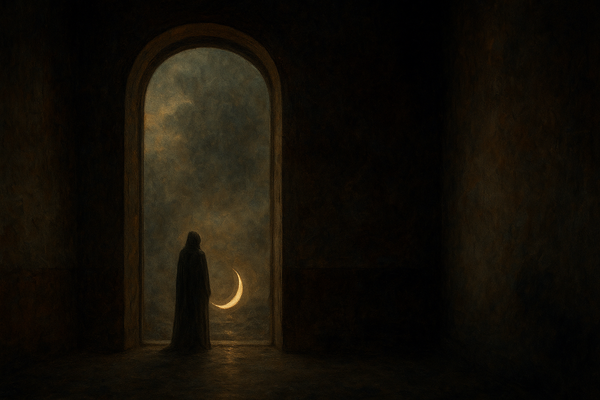DUST PNEUMA

In a shuttered classroom, chalk dust lifts into script; breath learns to write back. A vow traces a lung-sigil; the room teaches the hand. Pressure reverses, protection speaks. Fluorescents tremble; the bell’s afterring hangs — fine, white — behind the ribs.
I. THE ROOM THAT REMEMBERS YOUR BREATH
You key open the corpse-calm room and it keys you back — a subtle reciprocity of lock and lung, of actuator click and glottal opening, as if the metal wants what you hold and the body wants what the room withheld, as if the breath were the original credential and the door only pretends to decide — because the door was always a throat and the throat was always a door.
Dust veils the morning like a soft reprimand. Chalk tastes of aspirin, tooth, ash. Slate carries a faint umber sheen, the gloss of old fingerprints and older promises, a skin of calcium ghosts, a dermis of forgotten pedagogy. In the hush you hear the bell’s afterring — low, residual, like a struck coin deepened into time — and you feel it ring your ribs, an inner minim that counts what the clock refuses to keep: those seconds that were not sanctioned, the hushes that held meaning at the edges of instruction, the ache of attention nobody ever graded. The desks posture in rows like little altars to an almost.
You flick on the fluorescents, and their tremor answers the tremor in your hands, the hands the years have taught to sign a dozen names of care and a handful of names of cruelty. There was always curriculum. There was also the quiet curriculum of the body: clenched jaw, bitten cuticles, the raised pink saucer of a scar where the compasses pierced the pad of your thumb, a tiny stigmata the faculty handbook never diagrammed. You came back because vows do not end when payroll does. You came back because some protections are built of breath and need renewal at the place where the breath first learned to break.
You write the first word. (The word is a sigil disguised as syntax; the syntax is a net masquerading as sentence; the sentence is a spell pretending to be care.) You suture a last ward — clinical, profane, exact — across the slate: letters with tendons, grammar with a pulse. The point of the chalk abrades to powder. You taste it. Your tongue remembers teeth; your palate remembers prayer; your lungs recall the chalk-haze of every failed rehearsal of authority. The line flashes with microscopic fractures — white lightning caught in stone night — and the room brightens almost imperceptibly, as if the wall were a diaphragm and your calligraphy the first breath of a sleeping beast.
You write for those who aren’t present and are not absent either, those who linger in the negative pressure of your chest. [We keep you, we keep you.] The formula borrowed from the Lesser Banishing Ritual of the Pentagram — east to south to west to north to center — renders as a choreography of strokes: E→S→W→N→C. You lay the line; you lay the line again; you lay the line that lays you. Thelema’s ABRAHADABRA — word of the Aeon of the Child — hides in the acrostic of your marginal notes. Enochian squares whisper in the lined paper of your palm, cellular grids remembering their origami of light. The clinical part of you logs parameters. (Particulate diameter: 1–10 μm. Flow regime: initially laminar, quickly turbulent. Deposition bias: alveolar. Risk: known; desire: known better.)
Because this is how a vow is built: you let the sentence breathe; you let the sentence bruise; you let it break your neatness and make you common with the chalk that breaks itself to mean. The afterring crosses your sternum again — once, then once again — and you understand that the bell is now wherever you place it, that time will do as told if the telling is true enough to bleed.
Here is the recursive hinge: the room teaches you how to write the ward; the ward teaches the room how to remember breath; the breath teaches you how to read the room; the reading returns you to the first word, where the first word, now charged by its circuit, opens a second mouth and says: write me inside.
So you do what no instructor manual sanctioned: you pull breath like a filament through your own bronchial labyrinth; you let the chalk-dust seed your alveoli like a very small constellation, a Milky Way moved inward, starry abrasion, calcium’s benediction. You inhaling is you inscribing. The board blackens a little where your lungs brighten, a two-body problem of language and flesh, each leaning, each learning the other’s gravity. You feel the sigil lay down beneath the breastbone as a winter map: white roots fanning, cuneiform tracheal, a biro of frost signing your inner glass.
And when you stop — because vows require stops to gather their velocity — the quiet that replaces writing is denser than sound. That quiet clicks like a geared cosmos. The fluorescents hum their minor god. The room holds still long enough for you to notice: a powdery halo of motes just above the board, not falling, not floating, listening.
Afterring.

II. THE HALL THAT WRITES ITSELF
The moment breaks like a thought you almost had. The chalk-dust — obedient to gravity until it isn’t — rises. An ascension by attention. First arrhythmic, then smoothing to laminar scripture, the motes choreograph themselves into a pale cardiogram of breath. The hallway receives a diluted weather: a stirred cathedral of motes, an aisle where no priest moves because the dust is doing the moving, because the moving is the priest.
You step out. Lockers gloss with slate sheen as if they remembered the rock they once were and would prefer to return. The chalk traverses the corridor without hands, writing in the weak magnetism of breath that every body emanates and misnames as aura. (Call it pneuma, because the Greeks were honest about air when it turned articulate, because every science is a late confession of an earlier cult.) The letters appear: We keep you, we keep you. Then: We count your ribs. Then: We name your fear and stand between.
The hall echoes with sneakers remembered. Your feet ache as if the past were a distance. You pass the trophy case where championships stand like domesticated thunder, and in the glass you glimpse the first betrayal — the shape your mouth made when you once told a girl to be quiet because the curriculum needed the air, the air she was using to cry. You are the teacher who knew better and did worse. The sentence knows this. It does not punish you; it includes you as the cost. Protection is possession, and possession is first of breath, murmurs a voice you do not hear so much as accept, a clause of Dust Pneuma braided through the murmur of the vents, italicized by the tremor behind your left eye.
At your knee a small weather gathers. Child-shaped. Chalk for eyes. Ribs of ringing air. The child says nothing, the silence flaring with the same polite ferocity you taught in September, as if silence itself had learned to raise its hand. You nod, because nodding is a literacy older than alphabets. Because you know what it wants before it asks: finish the glyph inside your lungs.
How do you write there without a tool? You do what you did as a child when sentences were sugar and breath was teacher: you mouth the words without voicing them. You let the tongue map the ciphers against the palate. You let the bell’s afterring be your metronome. Inhale on the nominative; hold on the verb; exhale on the object you cannot forgive. You craft a breath-meter — four count, seven count, eight count — that lulls your vagus like a soft-hammered gong. (This is science too: parasympathic hum, heart-rate variability, diffusion of partial pressures, the alveolar sac as chapel of exchange.)
The eddy swells. You see inside it a year the school never counted: the October you bled quietly in the copy room, the March you taped a boy’s knuckles after he punched the wall and told him he had hands for shelter, the June you failed a child because failure was the only sentence the system provided and the one you knew how to proofread. The eddy is tender with your rot. Dust Pneuma loves without excuse; you flinch because the love recognizes your ulterior motives and holds them anyway, and this is the kind of recognition that flays pride and salts it and returns it as a cloth. The eddy wants what you want: a law that is a lullaby, a rubric that can risk being wrong to be kind.
You could stop. You do not. You draw breath like wire until it sings, until the friction lights. You know the Golden Dawn pentagrams with your bones now: invoke earth in earth to ground the storm, call air in air to speak the sentence, bring fire to fire to cauterize the wound, invite water in water to dissolve your control, then center and name the Name you never let your mouth forget even when you forgot yourself: the Tetragram everybody mispronounces because pronouncing it is beside the point; it is made to be breathed.
Here the architecture of the story loops. Here the recursion clarifies. You are teaching, but the room is the teacher, but the breath is the room, but the dust is the breath, but the child in the doorway is your mouth, but your mouth in the doorway is the child. The sentence that writes itself on lockers is the same sentence your bronchi are learning to bear without rupturing. The bell’s afterring arranges itself into an ethics: sound persists after sanction; attention continues after permission expires; you may be retired but the vow you made never acquired the luxury of rest.
A locker shuts itself three doors down. You know the sound as if it were the end of September quizzes, as if it were rain that joined a chorus. In its reflection you witness a glyph you have not drawn yet but will: a sky-letter, frost-bright, hovering. Future invades present with the cocky inevitability of a kid who has learned a new game and wants you to watch. Time — docile when surveilled by adults — reveals its delinquency when nobody is grading it: it folds, it copies answers from the next page, it cheats forward. You forgive it because curriculum taught you to resent that move and vow taught you to love it: the only way to write a future that protects is to let the future write you back.
You turn, and the child-shaped eddy turns with you. A shared choreography of pivot and hush. The dust letters slide along the corridor, a sentence practicing its signature until the signature begins to recognize itself. [We keep you.] The bell doesn’t ring. Its afterring does.
Afterring.

III. THE LUNG-SIGIL AND THE ETHICS OF AIR
The room receives you like a scar receives pressure: it remembers too much and too exactly. You draw the window open to let the ghost weather in — it behaves as if you invited it, as if hospitality were a physics — and you return to the board because the board is where the body can measure the vow. You place the chalk at the exact place the previous arc insisted you would, and the line waits like an artery before incision.
Breathe. Four counts in. Seven holds that hurt. Eight counts out that scrape. The syllables cycle: Keep you. Count you. Stand between. The chalk agrees. You pull a final line and let it fall. You close your eyes and enter the atrium where the abstract comes home to cartilage. Bronchi as white roots. Alveoli as a million small mouths tasting the world. Surfactant glistening like sacrament. You write by inhaling. You inscribe by surrendering. You sign your name where names go to die and be born as verbs.
It is not painless. Nothing that matters was. The dust cuts like paper; the paper cuts like history; history cuts like a rubric righteously enforced on a body the rubric never imagined. Your chest warms where the sigil seats; you feel a rumor of heat, a little hearth of oath beneath the sternum, and your palms slick. You remember the first child who flinched when you called their name because all calling had been claws before you; you remember the last child who laughed at your terrible joke because joy also lives here; you remember the day you graded yourself and gave an honest D for mercy. The sigil says do better without contempt. The sigil says I will help. The sigil says you are not your efficacy; you are your effort as it discovers integrity.
Then the Dust Pneuma speaks — not with sound, but with distribution, with a redistribution of you inside you — * we are not your miracle; we are your duty metabolized.
- The italics bloom across your inner sight like chalk lit from within. We take only what you willingly exhale; we return it in configuration. You have treated air as privacy. Treat it as commons. Guard it as if you were not the guard but the gate.
You open your eyes. The child-shaped eddy stands inside your footprint now. Ribs of ringing air. Eyes of chalk. It lifts a hand without lifting a hand. You recognize the gesture: permission sought without presumption. You nod. It clothes your lungs with a pattern older than classrooms and younger than this moment — a theurgic overlay, a mesh that hums like bees. You see correspondences neatly label themselves in your mind’s margins: Kether to crown of skull (please mind your breath), Tiphareth to sternum (hello heart), Yesod to diaphragm (moon in muscle), Malkuth to soles (earth in every exit), Da’ath as the unnamed in the throat (knowledge that knows what silence knows). The map anchors without imprisoning.
Ethics arrives not as a rule but as resonance. The recursion closes a loop and opens a larger one. You understand that protection is not a perimeter; it is a pressure differential that keeps the weak from collapsing. You understand that keeping means being kept: mutual enclosure, mutual exposure, a flow you do not own. You understand that writing a ward into air means you will be read by the very bodies you sought to hide. There is no secret that does not turn into shelter when given cost.
You want to weep but you breathe instead. It is the same gesture at a kinder angle. In. Hold. Out. The system of you recalibrates around the vow like iron filings align to a magnet they cannot see and cannot deny. Your sternum unbuttons a little — as if letting light in were a mechanical operation you never learned in shop. You think of the times your voice was a weapon and of the hours your quiet was worse. The sigil won’t cancel your history; it will console it into usefulness, like a scar reimagined as a seam in a garment meant to hold more than it looks like it can.
The eddy turns. The dust letters on the lockers return like obedient flocks. The room’s fluorescent god dims its tremor — as if liturgy has been observed — and in the hush you hear it: the bell that doesn’t ring and keeps ringing, coupling your pulse to a syntax older than the first alphabet that dared to fossilize breath into bone. You think: the lesson plan inverts tonight. You think: the sky will answer. You know: you will be graded by what wakes under the sentence that stops mid-air and keeps breathing.
Afterring.

IV. SKY-BOARD, MID-AIR SENTENCE, UNVEILING
Night writes the world with a sharpened dark. The block sleeps but the sky refuses; or refuses sleep as you were taught to refuse cruel instruction with elegant dissent. The board ascends. Not literally, not theatrically — no ropes, no pulleys, no gasp-worthy levitation — but in the only way that matters to a vow: the sky begins to behave as if slate, and the slate begins to behave as if permeable to stars. Letters flower frost-bright on the firmament, pale burnings, calcium auroras. People in the neighborhood roll in their sleep and find themselves swaddled by a grammar they did not request but recognize like a mother’s hum last heard in a womb.
The lesson plan inverts. The vow grades you. Windows pearl in the rowhouses. Streetlight annuli crown the block like modest haloes. Dogs whine very softly, the animal body primed to notice sentences it cannot parse and cannot resist; infants sigh as if someone turned the page of a very large book and the air brushed their cheeks. Above the intersection the sentence stops mid-air. It could terrify. It consoles. Because the stop is not absence but aperture, the dash that says and then you, the em that whispers finish me by breathing.
You stand in the schoolyard, the custodian light an amber square behind you in the office window, and you accept what you did not come to accept: that the ward does not belong to you; that the Dust Pneuma is not your conjuration but our commons learning how to keep itself; that a vow is a lens, not a leash. You think of every child you called by name and every child you never learned to pronounce because you were tired, because you were trying, because intention is not absolution but it is an ingredient for repentance that works. The sky gives back what breath took: a mirror.
Recursive architecture tightens. The sentence you wrote writes you into it. The endings you withheld return as beginnings that do not ask permission to begin. The child-shaped eddy sidles to your side and you do not know if it is the ghost of a body that never met you, the composite of bodies that did, or the idea of childhood petitioning its own protectorate. It doesn’t matter. It matters exquisitely. It holds your sleeve as fog would hold a lamp and says nothing because nothing is the only word big enough now.
Here is the unveiling, the single kernel, the unmakeable made. Not a twist. Not a trick. A recognition too simple to be simple: breath is the smallest unit of governance. All craft is the art of distributing air without domination. All ritual is the choreography of shared respiration. The body is a parliament of needs that votes with oxygen; the neighborhood is a lung the size of faith. Your ward does not keep them; your ward teaches the town to keep itself by practicing the sentence that ends mid-air and is completed by whoever inhales next.
So you inhale. You hold until it trembles — not as penance but as praise. You exhale with your whole mouth, your whole chest, your whole history. The sky answers with the bell’s afterring because the bell is everywhere now and nowhere, it is the resonance of the sentence you finally stopped trying to own. You feel the sigil under your sternum cool to a steady ember.
You do not cry. You perform the simpler miracle and stay. The stories you told inside your lungs learn to tell the street how to breathe. The children who aren’t there inhale in their beds on Meridian and Rice and Tillbrook and all the hidden side-streets with their night-blooming privacies; their chests rise and fall under a clause you will never finish. You hope you never do. You leave it deliberately undone because undone is how a doorway works.
Tomorrow you will make tea like a salaried person, and nobody will believe what the windows knew. You will watch ordinary breath fog a cold pane and you will write an invisible letter there for a name you never learned to say perfectly. The letter will evaporate. That disappearance will be the lesson. You will repeat the lesson until the repetition writes a new world or you end — whichever comes first, which is to say: both at once.
You turn back toward the building. Your knees hurt like truths. Your shoulder clicks like a new page tilting. You touch the door that you now understand is your throat, and you whisper (the whisper is to everyone) Keep you. Count you. Stand between.
The sky does not blink. It breathes.
Afterring.




